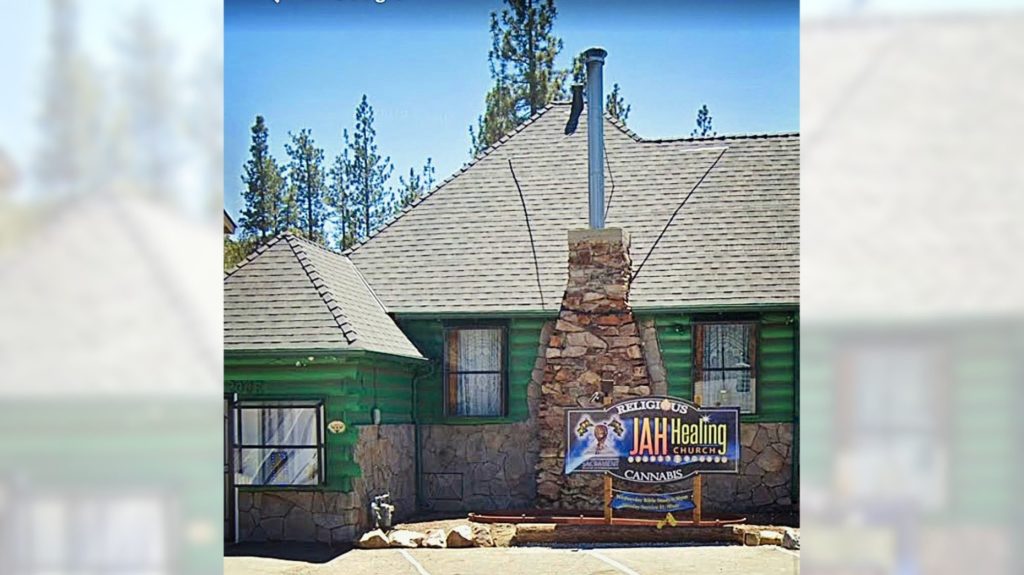News Provided by East Bay Times
The Jah Healing Kemetic Temple of the Divine Church in Big Bear City has been fighting San Bernardino County for nearly five years trying to stay open. The county maintains it is an illegal marijuana dispensary in that it violates an ordinance banning commercial cannabis operations in unincorporated areas. (Photo courtesy of the Jah Healing Kemetic Temple of the Divine Church)
A Big Bear City cannabis church that was shut down by San Bernardino County — and twice rebuffed in the courts in a bid to reopen — is now taking its fight to the state Supreme Court.
Jah Healing Kemetic Temple of the Divine Church, which considers cannibas a sacrament and denies the church functions as an illegal dispensary, lost its most recent challenge when the Fourth District Court of Appeals in Riverside upheld San Bernardino Superior Court Judge David Cohn’s June 2020 decision ordering a permanent injunction against the church.
Attorney Matthew Pappas, who represents the church and its owner, April Elizabeth Mancini, has petitioned the state Supreme Court to review the appellate ruling. And he vowed to pursue the case all the way to the nation’s high court, if necessary.
“I do intend to take it as far as the U.S. Supreme Court if the California courts continue to rule against the church,” Pappas said. “There’s no guarantee the U.S. Supreme Court would hear the case, but it is an important issue.”
Fourth District opinion
In an opinion handed down on Sept. 13, a three-justice appellate panel concurred that a county ordinance prohibiting commercial cannabis activity in unincorporated areas does not violate its religious protections under federal law. And while state law allows commercial cannabis operations, it gives discretion to cities and counties to draft their own ordinances to prohibit such activity.
Additionally, the appellate panel ruled the San Bernardino County ordinance does not prohibit church adherents from possessing, blessing, or consuming cannabis products, but that it prohibits the church from selling and dispensing the drug.
And while the church maintains it is a nonprofit entity whose adherents were receiving “cannabis sacraments” for donated tithings, the three-justice appellate panel determined that did not matter.
“The ordinance prohibits, among other things, the ‘dispensing’ and ‘distribution’ of cannabis, ‘whether or not for profit.’ By its plain terms, the ordinance covers the Church’s quid pro quo scheme,” Fourth District Justice Carol Codrington said in the opinion, in which Justices Art McKinster and Michael Raphael concurred.
Rocky history
The church and county have been locking horns since December 2017, when county code enforcement officer David Jorgensen first inspected the church at its previous location at 1020 Big Bear Blvd. He smelled marijuana wafting in the air and saw a sales room inside the church.
Mancini’s parents told Jorgensen the church dispensed “blessed cannabis” to its adherents as sacrament. Jorgensen slapped the church with a notice of violation, according to the appellate court opinion.
Two months later, in February 2018, Jorgensen revisited the church and found nothing had changed. Mancini denied the church was a dispensary. This time, Jorgensen issued Mancini a citation.
By April 2018, the church had moved to its present location at 208 E. Big Bear Blvd. And it started generating resident complaints, a sheriff’s spokesperson said.
The county obtained a search warrant and raided the premises, finding a mound of evidence that the church was operating as a dispensary, including jars stuffed with cannabis, cannabis-infused drinks and edibles, vape cartridges, teas, creams and oils.
Additionally, there was evidence of financial transactions inside the church, including cash registers, pricing information and an ATM machine. And during a subsequent inspection, Jorgensen again spotted cannabis products in the church as well as a “cash only” sign, the appellate panel noted in its opinion.
In September 2018, the county sued the church and Mancini, alleging it was operating an illegal dispensary, and the legal battle ensued for nearly two years. Yet the church continued operating as it always had.
Sheriff’s narcotics investigators, as well as investigators with the Department of Consumer Affairs, joined forces with code enforcement officers and ramped up efforts to crack down on the suspected marijuana dispensary allegedly operating under the guise of a church.
During a hearing before Judge Cohn in San Bernardino, Department of Consumer Affairs investigator Lauren Hannon said she had investigated the church’s premises four times from October to November 2019 and consistently observed people entering the church through the front door and exiting through the back door while carrying a brown paper bag
Finally, in June 2020, the judge ordered a permanent injunction against the church, forcing it to close its doors, supposedly for good.
But Pappas hopes that changes.
Fight rages on
In his petition to the state Supreme Court, Pappas urged the justices to resolve an important area of the law involving core state and federal constitutional rights.
“How is the provisioning of cannabis, blessed into sacrament, the commercial provisioning of cannabis to members? It’s not,” Pappas said. “It’s not up to the courts to dictate the beliefs and practices of the church. The beliefs and practices of the church are what they are.”
The first of the church’s nine epiphanies, according to Pappas, says: “I retreat to the forest with the entheogen to summon the Divine One and manifest the truth.” An entheogen is a psychoactive substance.
That goes to the crux of the church’s argument that adherents are free to take their cannabis sacraments outside the church and into their private domains.
“Under our state and federal constitutions, secular courts do not dictate or alter the sacred religious practices of churches,” Pappas said. “The blessing and provisioning ritual is a central and vital part of the church’s beliefs.”
H/T: www.eastbaytimes.com



